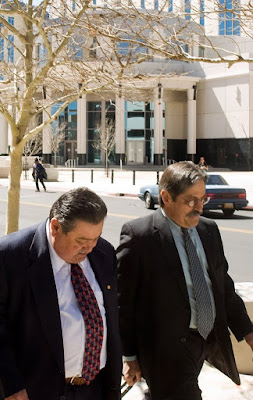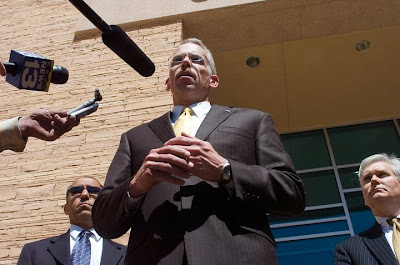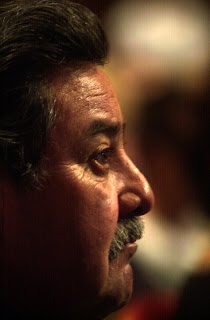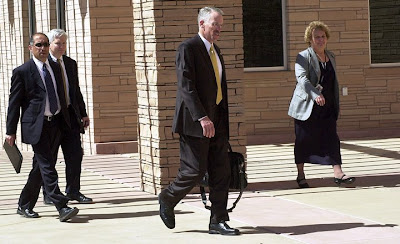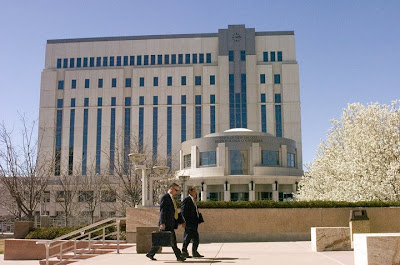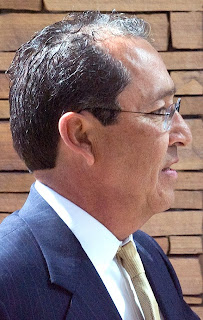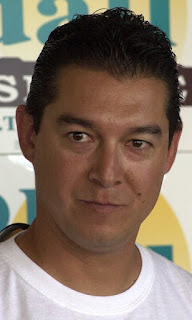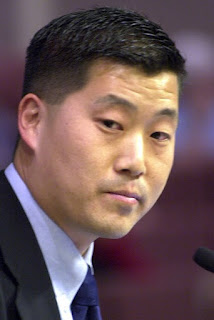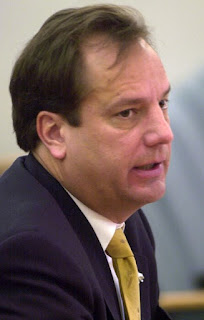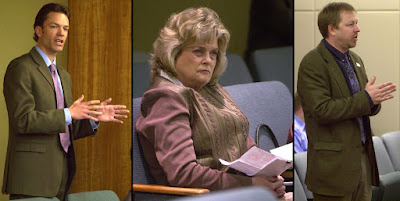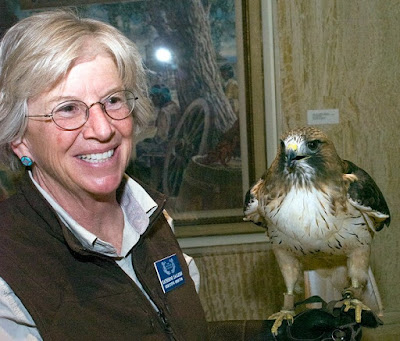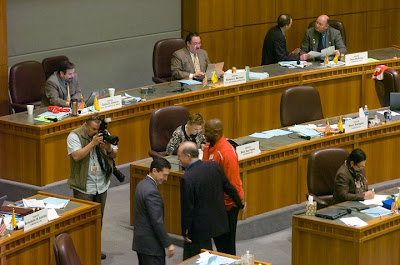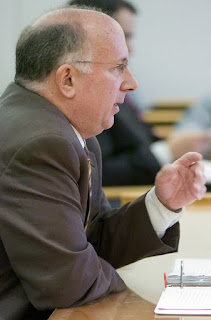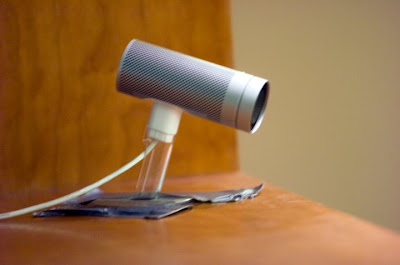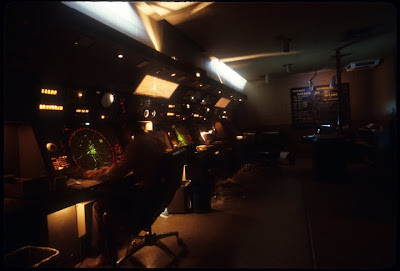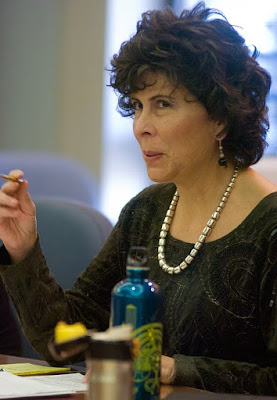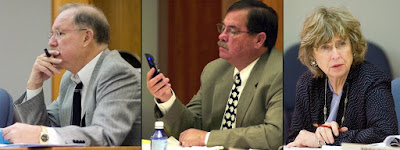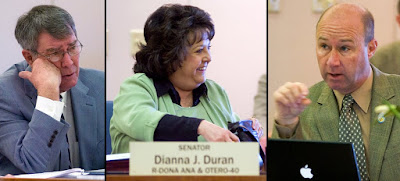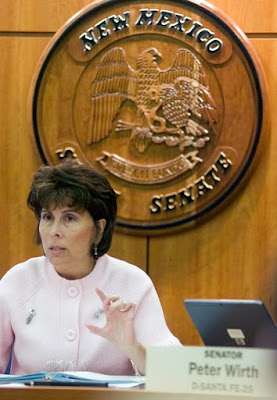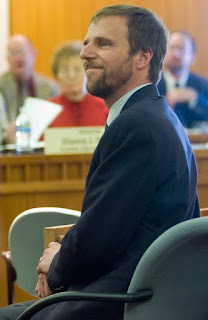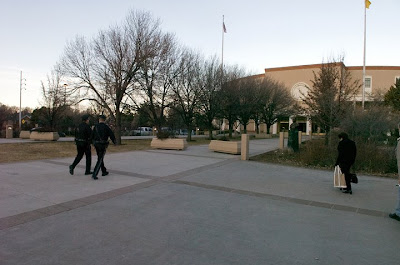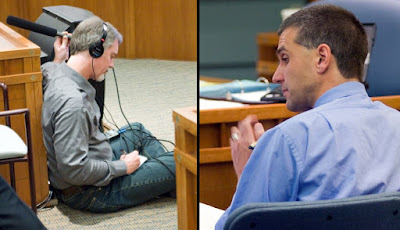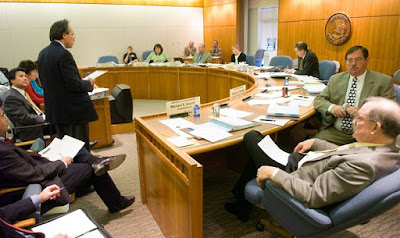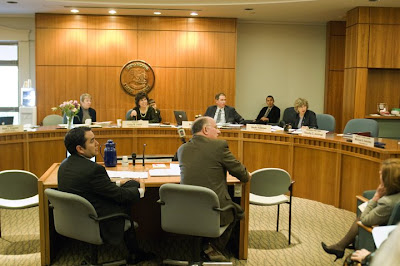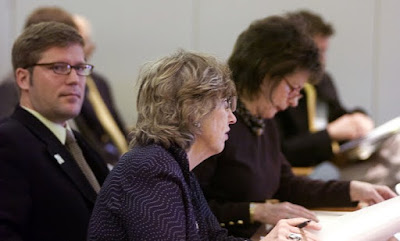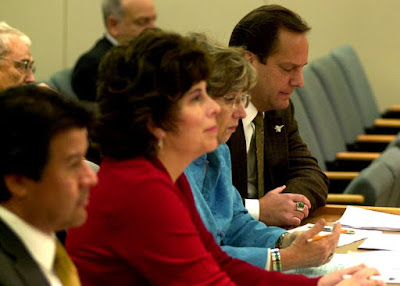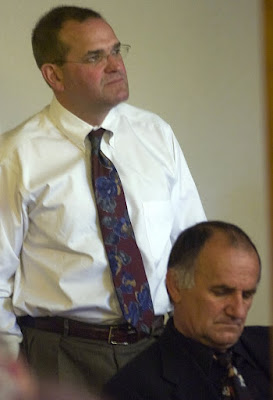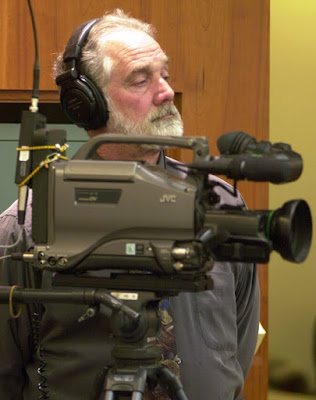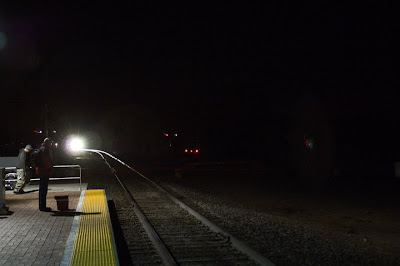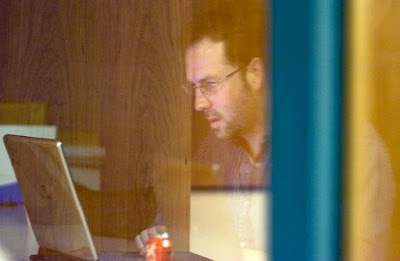 This is the New Mexico Independent’s Managing Editor David Alire Garcia's, reflection in the glass, while working in the Senate press gallery of the State Capitol in Santa Fe during the recent death penalty debate. The plaque next to the entry door reads “Print Media Gallery.” The Roundhouse was opened in 1966. The print media is not what it used to be. The print media still exists, but television and other non-print media now share the room. There are a lot more people in the room these days than there were 40 years ago.
This is the New Mexico Independent’s Managing Editor David Alire Garcia's, reflection in the glass, while working in the Senate press gallery of the State Capitol in Santa Fe during the recent death penalty debate. The plaque next to the entry door reads “Print Media Gallery.” The Roundhouse was opened in 1966. The print media is not what it used to be. The print media still exists, but television and other non-print media now share the room. There are a lot more people in the room these days than there were 40 years ago.Alire Garcia wrote a commentary based on a blog posting by Santa Fe County Sheriff Greg Solano, calling it the, "most interesting Roundhouse postmortem, in my humble opinion."
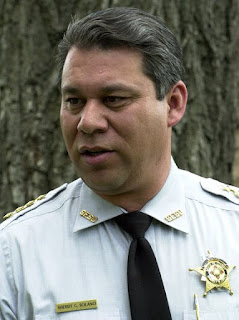 Solano, right, writes a blog, quaintly entitled, “Sheriff Greg Solano Blog The online ramblings of the Sheriff of Santa Fe County, Santa Fe New Mexico.”
Solano, right, writes a blog, quaintly entitled, “Sheriff Greg Solano Blog The online ramblings of the Sheriff of Santa Fe County, Santa Fe New Mexico.”It’s a must read for me. Our profession binds us. When I first met him, I was very active as a police union leader in Albuquerque and he was a rookie with the Santa Fe Police Department. Santa Fe cops were in the beginning stages of forming a union and consulted me in how to proceed with their city government. Over the years, Solano would attend State Fraternal Order of Police conferences and it became clear that he was a quiet, thoughtful and articulate young officer. It was no surprise to me that he would be engaged in protecting officers as President of the Santa Fe Police Officers Association and would become more political and advanced through the ranks. His election to Sheriff was the culmination of his years of hard and dedicated work. His reelection in 2006 assures him his position through 2010, when he is term limited out of office. He has already announced his intention to seek the 2010 Democratic Lieutenant Governors primary nomination.
I was about to post an entry on why lobbyists should not be treated as pariahs. However, Solano jumped up with this issue, which takes precedence. The lobbyists will be along shortly.
Solano writes:
"Has the legislature become beholden to the media?"This is not the first time Solano has written about politicians and the media.
Solano’s premise is, that the media has its own agenda and it was displayed this legislative session by wielding "undue influence" on legislators.
Solano asks:
“Should the media once they switch gears from just reporting the news to pushing an agenda be forced to register as lobbyists? Or is the media out of line?”Solano concludes,
“Would anyone in the media dare to write an editorial exclaiming that the media has had undue influence and the legislature has become beholden to the media lobby? I will not hold my breath.”So what’s wrong with this picture?
Solano is correct, but for the wrong reason. I, like many others in the media, are not going to write that we have "undue" influence over the legislature, because that is the role of the media, to push the public agenda.
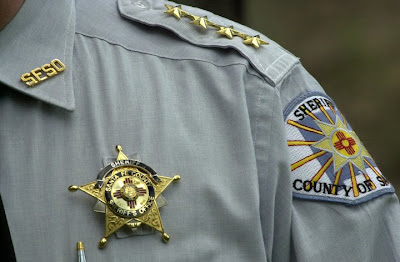 He has broad shoulders and broad authority, he just got off track. He knows the oath he took and is very articulate about it. It's easy to do when issues become emotional. It seems that he sees the media watchdog role getting a little yappy.
He has broad shoulders and broad authority, he just got off track. He knows the oath he took and is very articulate about it. It's easy to do when issues become emotional. It seems that he sees the media watchdog role getting a little yappy.The 1790’s press, which the First Amendment was written to protect, was a purely ”political press.” Political parties owned printing presses.
The press has been referred to as the Fourth Estate, as a check on government. Even elected officials who were not enamored with the press recognized the importance of the media in the operation of government. Thomas Jefferson wrote in 1787:
The basis of our governments being the opinion of the people, the very first object should be to keep that right; and were it left to me to decide whether we should have a government without newspapers or newspapers without a government, I should not hesitate a moment to prefer the latter.Over the years, the idea of how the press should operate has continually changed.
There has been a school of thought that reporters should simply be flies on the wall, watching events and reporting on outcomes. Asking questions of participants doesn’t always reveal the motives of the political players.
Blogging, depending on the particular blogger, seems to be returning to the political press, as known by the first Congress that was voted into office, based on our Constitution, when they drafted what would become the First Amendment.
When politicians don’t want to have their actions scrutinized, it is the duty of the media to push and to push hard.
This session happened to align itself through a series of events, some caused by the ham fisted and overbearing manner of the legislative leadership in trying to shut down their self mandated openness. Some because of the lack of money shifted the focus to other items. Some of it was because of the emphasis placed on the number of ethics bills and the importance that the media decided those bills should have. Some in the media argue that people are frustrated by the corruption cases of recent years and are demanding something be done. The legislators must have been hearing the same thing based upon the number of bills submitted covering a wide range of ethics topics.
When the Senate committee on committees, just prior to the opening of the session, decided to thwart a piece of legislation which would have assured C-SPAN style gavel-to-gavel coverage of floor sessions. They, had to overrule their own majority. The committee's majority claimed webcasting would be too expensive during the economic crisis. No one bought their line. A previously passed bill provided for the purchase and placement of a three-camera video system for webcasting their floor actions.
In a multi billion dollar budget the cost of a couple of technicians for the 60-day session couldn’t exceed by much, the coffee fund.
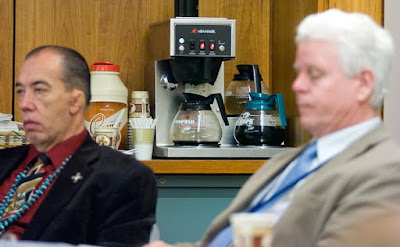
However, it's not just coffee, it's also feeding legislators breakfast at morning committee meetings. The food was delivered by the Assistant Sergeant at Arms David Ortiz, left, and the Committee assistant, Michael Riley, right above.

Here are Senate Minority Leader Stuart Ingle, R, Chaves, Curry, De Baca and Roosevelt Counties. left and President Pro Tem Timothy Jennings, D, Chaves, Eddy, Lincoln and Otero Counties, eating Breakfast Burritos in the Senate Rules Committee room.
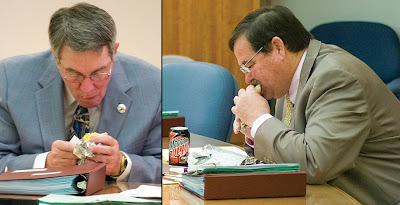
They were two of the members of the Senate committee on committees who voted to remove the installed cameras from the chamber. Senate Majority Leader Michael Sanchez, D, Valencia County, sits on the Senate Rules Committee with Committee Chair Linda Lopez, Bernalillo County, both had voted against commencing the webcasting of the floor. Having four of the eight Senators who voted against webcasting made Rules an easy choice as the committee to cover. That and it being the funnel of all ethics bills.
I don't have a problem with legislators eating or that food and refreshments are served, even if it is on the public's dime. What I object to is the hypocrisy of claiming the legislature can't afford a few thousand dollars for a couple of video technicians. The salaries and employee benefits of just the senate side employees for the 60-day session is $2,830,400, according to the feed bill. What's another few thousand dollars to open up government to the people.
No, the reason was Senate and House leaders don’t want to be seen by the public on an electronic medium. In the shadows of the well of the Senate, there is an obscurity of being hidden in plain sight. Further, they are masked by complex procedural rules that the ordinary citizen, governmental employees, sometimes journalists, and even legislators have difficulty understanding. Those in control, either ignore their own rules or they refuse to follow the interpretation of their own parliamentarian. To watch creates an impenetrable fog.
When the media calls the system to account, that is not pushing some agenda that only benefits them, it is pushing the people’s agenda. Openness must be the first order of government. If the procedures are shrouded or closed, then the process is already corrupted.
The people, as found in the preambles of the Constitutions of the United States of America and the State of New Mexico; the “We the People….” The people who, in setting up their governments limited those elected, appointed and hired to act for all of us, had no intention of having them exclude themselves from continuous accountability.
Senate Rules 23-3 reads:
Passes shall be issued by the chief clerk to duly accredited members of the press, radio and television, which allow them the privileges enumerated herein. At the chief clerk's rostrum, an area of four or five seats may be made available for the writing press. During the committee of the whole, television cameramen may be allowed on the floor to photograph the speaker. Television and still photographers may be allowed on the corners of the lieutenant governor's rostrum for purposes of photographing senators and senate activities. A sergeant-at-arms shall be posed to prohibit visitors from the two press boxes. Passes shall also be issued by the chief clerk at the request of and to be countersigned by the senator or the president for the period designated by the senator or the president to members of the senator's or president's family or special guests as evidence of the privileges granted under other rules passed by the senate granting such privilegesI for one try not to acquire press passes under the theory that I don’t ask permission to exercise my constitutional rights. Government does not get to determine who the press is.
 The best quote, on determining who the press is, came from United States Supreme Court Associate Justice Antonin Scalia, who said in Los Angeles Police Department v. United Reporting Publishing Corporation:
The best quote, on determining who the press is, came from United States Supreme Court Associate Justice Antonin Scalia, who said in Los Angeles Police Department v. United Reporting Publishing Corporation:I assume journalistic purposes under this statute could be somebody who has a Xerox machine in his basement.Websites were included by the petitioner's lawyer in response to Scalia's observation.
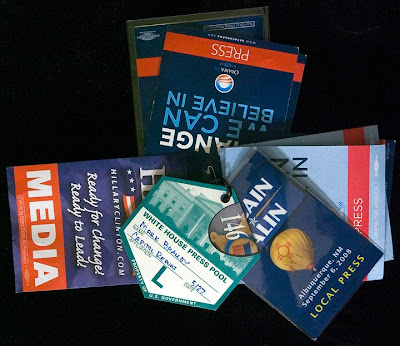 There are rare occasions when you have little choice. The Secret Service is one of those circumstances that can force you to play their game. However, it is actually campaign dictated. Here are eight press passes I gathered during last year's presidential campaign and one presidential visit. Only the White House pass had my name and affiliation on it. There were several McCain events where no credentials were issued. Their attitude, except when Sarah Palin visited was that the press was welcome. Hilary Clinton's event was stricter than her husband's, where the campaign ran out of credentials.
There are rare occasions when you have little choice. The Secret Service is one of those circumstances that can force you to play their game. However, it is actually campaign dictated. Here are eight press passes I gathered during last year's presidential campaign and one presidential visit. Only the White House pass had my name and affiliation on it. There were several McCain events where no credentials were issued. Their attitude, except when Sarah Palin visited was that the press was welcome. Hilary Clinton's event was stricter than her husband's, where the campaign ran out of credentials.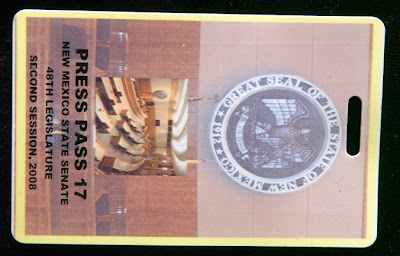 Last year, near the end of the session I was forced by a Senate Sergeant at Arms to get a pass. It seems that legislative staff members were using the press gallery as a lunch break room. It was a strange session as there were reports of the wireless system going down with rumors that the Governor's office claiming that the press was using up all the bandwidth.
Last year, near the end of the session I was forced by a Senate Sergeant at Arms to get a pass. It seems that legislative staff members were using the press gallery as a lunch break room. It was a strange session as there were reports of the wireless system going down with rumors that the Governor's office claiming that the press was using up all the bandwidth.The weirdest thing about the Senate pass, was during the election campaign, while proving who I was at security checks, the mere sight of this pass ended all discussion and I was passed right through. The pass doesn't even have a name on it.
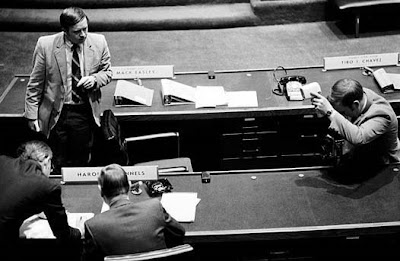 The way things are covered nowadays are drastically different than they were almost 40 years ago when the Albuquerque Journal’s Legislative Reporter Ed Mahr, upper left, posed Representative Harold Runnels, seated, and an unidentified member for Journal photographer Ray Cary, right, in the House chambers, circa 1970-72.
The way things are covered nowadays are drastically different than they were almost 40 years ago when the Albuquerque Journal’s Legislative Reporter Ed Mahr, upper left, posed Representative Harold Runnels, seated, and an unidentified member for Journal photographer Ray Cary, right, in the House chambers, circa 1970-72.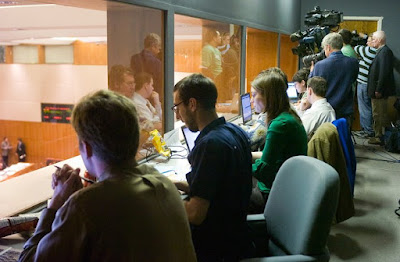 The gallery was packed to capacity during the death penalty debate. The journalists are: Albuquerque Journal's Staff Writer Dan Boyd, reflection in the window, the New Mexico Independent's Trip Jennings and KOAT TV's Santa Fe Bureau Reporter Larry Behrens, Santa Fe Reporter's David Maass, KRQE TV's Kaitlin McCarthy, Santa Fe Bureau Reporter Doland, Albuquerque Journal's Photographer Dean Hanson, and KOB TV's Stuart Dyson, standing with four videographers.
The gallery was packed to capacity during the death penalty debate. The journalists are: Albuquerque Journal's Staff Writer Dan Boyd, reflection in the window, the New Mexico Independent's Trip Jennings and KOAT TV's Santa Fe Bureau Reporter Larry Behrens, Santa Fe Reporter's David Maass, KRQE TV's Kaitlin McCarthy, Santa Fe Bureau Reporter Doland, Albuquerque Journal's Photographer Dean Hanson, and KOB TV's Stuart Dyson, standing with four videographers.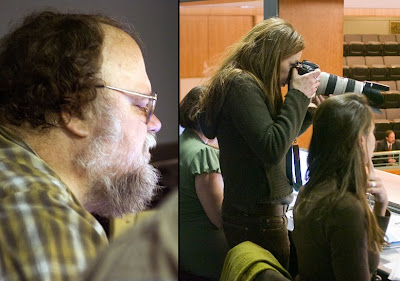 The Santa Fe New Mexican’s Capitol Reporter Steve Terell, left, and a staff photorapher were in the room, along with the scribe from New Mexico Legislative Reports, lower right.
The Santa Fe New Mexican’s Capitol Reporter Steve Terell, left, and a staff photorapher were in the room, along with the scribe from New Mexico Legislative Reports, lower right.The gallery quickly thinned with the television cameras moving out. Bloggers were the ones most interested in the webcam debate.
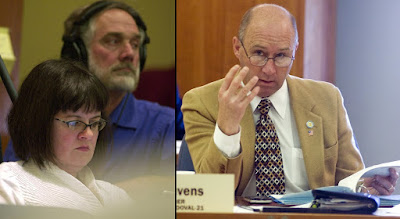 During my cooperative efforts in webcasting the Senate Rules Committee, Sen. Kent Cravens, R, Bernalillo County, above right, asked that the webcasters identify themselves. The New Mexico Independent’s Reporter/Blogger Gwyenth Doland, above left, introduced herself and explained that we were live casting the committee meetings. I introduced myself as providing the video feed to NMI.
During my cooperative efforts in webcasting the Senate Rules Committee, Sen. Kent Cravens, R, Bernalillo County, above right, asked that the webcasters identify themselves. The New Mexico Independent’s Reporter/Blogger Gwyenth Doland, above left, introduced herself and explained that we were live casting the committee meetings. I introduced myself as providing the video feed to NMI.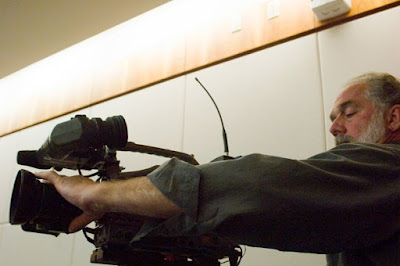 My cohort, Ched MacQuigg, above, chose to stand silent under the theory of Quo Warranto, a Latin legal phrase that literally means show me your warrant, your grant of power that authorizes you to ask such a question. MacQuigg is a bit prickly when it comes to being confronted by authority, and with good reason. My belief was, Cravens was helping our cause, not challenging it.
My cohort, Ched MacQuigg, above, chose to stand silent under the theory of Quo Warranto, a Latin legal phrase that literally means show me your warrant, your grant of power that authorizes you to ask such a question. MacQuigg is a bit prickly when it comes to being confronted by authority, and with good reason. My belief was, Cravens was helping our cause, not challenging it.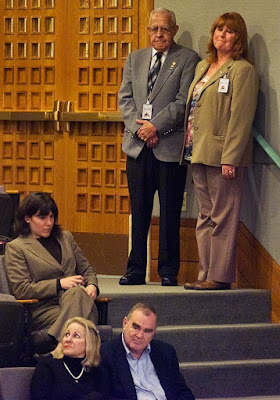 Later in the day, Senate Majority Leader Sanchez, had a Sergeant at Arms, above right, seek me out in the press gallery to ask for whom I worked.
Later in the day, Senate Majority Leader Sanchez, had a Sergeant at Arms, above right, seek me out in the press gallery to ask for whom I worked.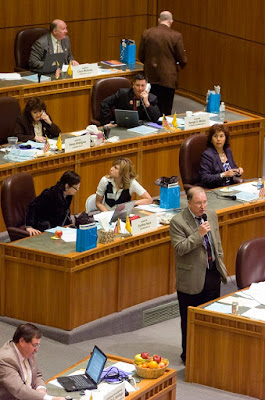 At the beginning of the final floor debate on Senate webcasting, Sanchez, standing, called me out, by name, “Mark, the webcaster,” several times, and after waving and making visual contact he said, “My daughter Katrina, says Hi.”
At the beginning of the final floor debate on Senate webcasting, Sanchez, standing, called me out, by name, “Mark, the webcaster,” several times, and after waving and making visual contact he said, “My daughter Katrina, says Hi.”Katrina Sanchez was a classmate of mine a year ago and is a receptionist at the Communications and Marketing Department of the University of New Mexico, where I have several acquaintances and friends. I had discussed with Ms. Sanchez the webcasting and her father’s reluctance over the issue. In talking to Ms. Sanchez since, she had no problem with her father using her name, and said it was his way of saying, that, if I had a question about his position, ask him, not her. Now she’s known him all of her life, so she has an advantage in understanding how he communicates, but he and I have stood only feet apart and I had no direct question for him. He's not spoken to me except from the floor.
Our webcasting coverage has been to provide: clear, in focus, close up images of legislators engaged in the public debate. On the commentary side of my role as a journalist, I’ll point out photographically, with still and video images, along with my writing, issues I think are of importance for the public to consider.
I exercise news judgement in making editorial decisions as to what I find important. My audience has to go alone with me. If they don't like where I take them, they're free to follow someone else.
If I also have legislators reading my take on issues, then so much the better. Suggesting that exercising my rights, and everybody else’s right to openly comment, through whatever medium they chose, does not make the effort undue influence, but a protected constitutional right.
Just one last thought, Solano thinks the media should be required to register as lobbyists. However, I wouldn't be required under the current law because I'm not paid. I believe in a free press and what I've done with the legislature this year, I have done for free.
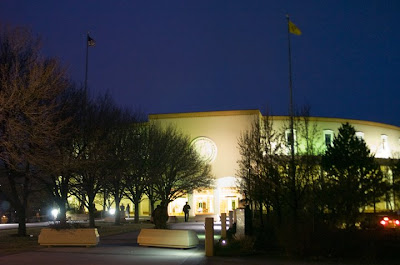 Exhale and take a deep breath Greg! No shots fired. Sorry, your issue was dead on arrival. The sun will rise and the media will try to pump as much light into the Capitol and every other government building as they can.
Exhale and take a deep breath Greg! No shots fired. Sorry, your issue was dead on arrival. The sun will rise and the media will try to pump as much light into the Capitol and every other government building as they can.
Just one last thought, Solano thinks the media should be required to register as lobbyists. However, I wouldn't be required under the current law because I'm not paid. I believe in a free press and what I've done with the legislature this year, I have done for free.
 Exhale and take a deep breath Greg! No shots fired. Sorry, your issue was dead on arrival. The sun will rise and the media will try to pump as much light into the Capitol and every other government building as they can.
Exhale and take a deep breath Greg! No shots fired. Sorry, your issue was dead on arrival. The sun will rise and the media will try to pump as much light into the Capitol and every other government building as they can.